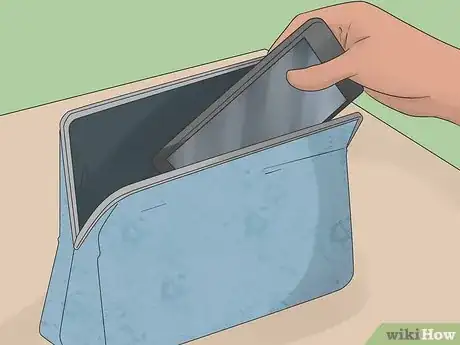This article was co-authored by Trudi Griffin, LPC, MS. Trudi Griffin is a Licensed Professional Counselor in Wisconsin specializing in Addictions and Mental Health. She provides therapy to people who struggle with addictions, mental health, and trauma in community health settings and private practice. She received her MS in Clinical Mental Health Counseling from Marquette University in 2011.
There are 10 references cited in this article, which can be found at the bottom of the page.
This article has been viewed 350,707 times.
It's an awful feeling to suspect your partner or spouse could be cheating on you, but you don't have to go through it alone. We'll help you work through the clues so you can get to the bottom of things and decide what to do next.
Steps
Assessing Your Relationship
-
1Take stock of your relationship. Think back over the course of your relationship to assess whether it is still fulfilling and happy for you both. Usually, if you take the time to look closely and think critically about your relationship, you can notice some red flags that something is wrong.
- The most common warning is simply when your partner tells you that something is wrong, but you dismiss their complaint. Some common phrases are, "This marriage isn’t working," "I'm not happy," "I need more than this."[1]
- More frequent arguments in a relationship can signal that a partnership is in trouble. Whether those conflicts are the result of an infidelity or the infidelity is a response to being in an unhappy relationship, fighting with your partner more often can be a sign that your relationship needs work.
- Unconstructive criticism by your partner could be a sign that something is wrong. If your partner becomes overtly critical, telling you to "Go to the gym," "lose weight," "talk to a therapist," they could be dragging you down to subconsciously justify their infidelity.[2]
-
2Evaluate your partner's physical behavior. If your partner is practicing infidelity, they may touch you less often or exhibit different sexual behavior. They may appear distant or distracted.[3]
- Pay attention to whether your partner seems less interested in being intimate with you. If they are receiving affection from another person, they may be less likely to need it from you.
- Take note of the way your partner touches you throughout the day. Has he or she stopped holding your hand or showing casual signs of affection? Greater physical distance between yourself and your partner could signal emotional distance as well.
- Notice during your intimate moments together if it feels different from usual. Your partner may demonstrate new sexual techniques that they have recently learned or practiced with someone else.[4]
Advertisement -
3Take a critical look at your own behavior. Think about whether you have been neglecting or ignoring your partner and your relationship, or if you have been treating him or her unkindly. Try to assess your behavior honestly, and from the other person’s perspective.
- If you have been neglecting your partner, they may be more likely to seek emotional and sexual fulfillment with someone else. A partner may embark on an affair simply to try and get their partner’s attention and prove to themselves they are still desirable.
- If you have been spending a lot of time away from your partner, or focusing too much on work or children, your partner may be lonely and looking for companionship with someone more available.
- If you have mistreated your partner, an affair could be one way in which they seek to get back at you while boosting their own confidence, or a means of exiting the relationship altogether.[5]
-
4Trust your gut. If your intuition is telling you that your partner is cheating, don’t dismiss it. According to a recent story in New Scientist, "our emotions emerge from our unconscious mind," so they tend to "reflect more information than our rational mind." Essentially, our gut instinct can save us from a lot of grief.[6] You might be picking up on subtle signals from your partner without being aware of it.
-
5Talk to your partner. If you are concerned that your partner is having an affair try to discuss the status of your relationship. Having a conversation can be an easy way to either confirm your suspicions or ease your fears. You might not get the answer you want, but at least you approached your partner honestly and openly.
- Pick a time when you are both relaxed and calm, not angry. If you begin the discussion on a negative note, it will be more difficult to have a productive conversation. Think "conversation" not "confrontation."[7]
- Chose the right place for your conversation. If privacy is paramount, chose an area where you two can be alone. If a public place puts you more at ease, offer to take a walk with your partner or visit a nearby park. A place that is around people, but easy to leave if your discussion becomes too heated, is ideal.
- Try to start the conversation by talking about yourself. Use nonjudgmental phrases, such as, "There is something weighing on my mind." or "I’m concerned about our relationship." Start your sentences with "I" instead of "you." This will help your partner be less reactive.[8]
- See if your partner is willing to discuss your concerns. It is a good sign if your partner is willing to work on improving your relationship through dialogue or couples counseling.
-
6Decide if it’s worth it. If your conversation does not go well, or if you sense that your partner is lying to you, take a hard look at your relationship and think about what you need. Is it really worth staying in a relationship with someone you feel you cannot trust? If you are suspicious of your partner, or think they are capable of deceiving you and breaking your trust, perhaps this is not the healthiest relationship for you.[9]
Looking for Physical Changes in Your Partner
-
1Watch for physical changes. Drastic changes in your partner's physical appearance could indicate that your partner is trying to impress a new love interest. Changes could also mean that he or she is actively looking for another partner.[10]
- Look to see if your partner changes or replaces their wardrobe. For example, if your partner normally dresses in athletic clothing, but suddenly begins to wear suits or tailored clothing, this may be a sign of infidelity, especially if there haven't been any major lifestyle changes, such as a promotion at work.
- Your partner may join a gym or begin working out more often to tone their body or lose weight for their new interest. Your partner’s new object of interest could perhaps work or work out at the gym that he or she has been frequenting.
- A sudden focus on their physical appearance and concern with looking good are potential signs that there is someone else for your partner to impress.
-
2Observe your partner's grooming habits. Your partner may start paying more attention to grooming if they are trying to appear attractive to somebody new. While in our current era it has become increasingly socially acceptable for both women and men to focus on personal grooming, a sudden change in habits could be a red flag.
- Watch to see if your partner bathes more often, flosses their teeth more regularly, shaves more often, and other types of grooming activities.
- Be aware of new makeup, perfumes or colognes, either applied by your partner or as residue from another person. The old cliché about finding lipstick on a cheating man’s collar has endured for a reason.
- Observe whether your partner has changed their hair. Do they suddenly have a new look or start dying their hair a different color?
Doing Some Investigating
-
1Look for changes in schedule. Pay attention to if your partner makes changes to their normal routine. They could be doing this to accommodate the schedule of their new interest or spending time with someone else. These changes can be large shifts in their schedule or small changes that suddenly appear.[11]
- Listen for more frequent excuses your partner may make about their schedule, such as staying late at work, traffic jams, or other mishaps that can explain why they are away from home more often.
- If your partner seems to all of sudden want to go out with their friends without you, this could offer a convenient alibi for their time away. Notice if your partner stops inviting you to work events and trips.
- Be on the lookout for unplanned business trips or other excuses they could make for being absent for lengthy periods of time.
- Alternatively, if your absence from your partner is suddenly not a problem, and your partner doesn’t seem to mind you working late or going away, they could be spending that time with someone else.
-
2Try to contact your partner. Are you suddenly finding it hard to get in touch with your significant other? If you repeatedly attempt to call your partner and they don't answer their cell phone, this could be a sign that your relationship is changing.[12]
- Your partner may make excuses about the phone's behavior. He or she could argue that a new phone has a dead battery, or is having technical problems, or that they were in an area with no signal.
- Be alert if your partner advises you that he or she is too busy to answer phone calls, or if they suggest that they should be the one to initiate contact.
- Is his or her phone turned off during times you can normally get through? Your partner could have silenced their phone to give them a chance to be with another person undisturbed.
-
3Pay more attention to new or unusual items your partner may leave laying around. Sometimes your partner will leave telling objects in plain view that indicate they are being unfaithful, such as house keys for another person's home.
- Review the details of shopping or restaurant receipts. Look through paperwork for contact phone numbers. Look for hotel room keys, movie ticket stubs, and similar types of items.[13]
- You may want to look around in your partner's car. Some unfaithful partners will hide or leave revealing items in glove compartments, ashtrays, or under car seats.
-
4Observe your partner's computer behavior. Your partner may spend more time on the computer chatting online or visiting social media websites more often.[14]
- Peruse your partner’s social media accounts. See if they have been chatting more often with one person in particular. Frequent exchanges with ex-partners can be a red flag.
- Check to see if your partner closes open windows or Internet sessions on the computer when you enter the room or if they regularly delete their browser history.
-
5Review statements from your bank or financial institution. Your partner may begin spending excessive amounts of money on activities with or gifts for their new interest.
- Look for large cash withdrawals or purchases made from stores and other places you rarely or never frequent.
- Watch out for credit or debit card transactions from restaurants or bars you have not visited.
Observing Cell Phone Usage
-
1Watch for attachment to their cell phone. Smart phones have made navigating an affair easier than ever. If your partner is unusually attached to his or her phone, they may be using it to communicate with a new love interest.
- Watch your partner to see if they keep the phone constantly by their side, such as during bathroom breaks, when taking a shower, or when stepping outside to take out the trash. This may be a sign that your partner doesn't want you to access their phone.[15]
- Some partners may also alter the settings on their cell phones to enable security codes or phone locks. This may be done to prevent you from accessing their personal data such as contact phone numbers or messages.
-
2Look out for constant cell use. Observe your partner for increased cell phone activity, such as more phone calls or excessive text messaging. Take note of the times of day these calls and texts are occurring. Ask yourself if your partner regularly communicated during these periods before.
- See if your partner acts suspiciously when on the phone or texting, like abruptly hanging up when you enter the room. Does he or she attempt to hide the texts that they are typing, or delete text messages quickly after sending or receiving them?
- If your partner is frequently speaking in hushed tones while on a phone call, they may be attempting to prevent you from hearing their conversation with someone new.
-
3Look for a second cell phone. If your partner is having an affair, getting a secret second cell phone is a smart move. With a secret phone, your partner would not need to worry about leaving a record of unexplained incoming and outgoing calls.[16]
- Prepaid cell phones are cheap and easy to purchase. If you see your partner with a prepaid cell phone, that was not acquired for work or another legitimate purpose, be concerned that he or she is doing something they wish to hide.
- Look in bags or purses for a hidden phone. It is unlikely that your partner would keep a secret second phone in a visible place.
- A likely spot for hiding a secret second phone is in the car. Look in the glove box or under the seats.
- Watch for strange or new bills arriving to your house. If your spouse contracted with a carrier for a second phone, there may be a paper record of the agreement. However, if he or she being very careful, he or she may have the bill delivered electronically.
Warnings
- Keep in mind that all of the signs listed above could either be signs of infidelity, or they could have completely innocent explanations. If you accuse your partner of infidelity, or are caught investigating them—checking their pockets, looking on their phone, reading their email—this could actually cause problems in your relationship that did not exist before.⧼thumbs_response⧽
- The signs exhibited by cheating women are basically the same as that of cheating men. Infidelity is not confined to men, although it is generally believed that men tend to engage in sexual infidelity, while women tend more toward emotional affairs. With the increasing economic and personal opportunities presented to women, independence even among married women is quite common. Along with this marked increase in independence comes a higher percentage of cheating wives.[17]⧼thumbs_response⧽
References
- ↑ http://www.webmd.com/sex-relationships/features/nip-infidelity-in-bud
- ↑ http://www.webmd.com/sex-relationships/features/nip-infidelity-in-bud?page=2
- ↑ http://www.womansday.com/relationships/dating-marriage/advice/a1586/11-signs-that-he-might-be-having-an-affair-107288/
- ↑ http://www.yourtango.com/experts/charles-orlando/10-signs-hes-cheating-expert
- ↑ http://www.researchgate.net/profile/William_Barta/publication/258189686_Motivations_for_infidelity_in_heterosexual_dating_couples_The_roles_of_gender_personality_differences_and_sociosexual_orientation/links/02e7e528ce2a3a5ff1000000.pdf
- ↑ http://www.cnn.com/2009/LIVING/personal/07/16/tf.trust.your.gut.instinct/index.html?eref=rss_us
- ↑ http://www.huffingtonpost.com/sheri-meyers/cheating_b_1844094.html
- ↑ http://www.huffingtonpost.com/sheri-meyers/cheating_b_1844094.html
- ↑ https://www.psychologytoday.com/blog/the-gift-adhd/201111/should-you-stay-or-should-you-go
- ↑ http://www.womansday.com/relationships/dating-marriage/advice/a1586/11-signs-that-he-might-be-having-an-affair-107288/
- ↑ http://www.yourtango.com/experts/charles-orlando/10-signs-hes-cheating-expert
- ↑ http://www.womansday.com/relationships/dating-marriage/advice/a1586/11-signs-that-he-might-be-having-an-affair-107288/
- ↑ http://www.yourtango.com/experts/charles-orlando/10-signs-hes-cheating-expert
- ↑ http://www.yourtango.com/experts/charles-orlando/10-signs-hes-cheating-expert
- ↑ http://www.yourtango.com/experts/charles-orlando/10-signs-hes-cheating-expert
- ↑ http://www.economist.com/blogs/babbage/2010/09/mobile_phones_and_infidelity
- ↑ Paver, F., Daring Wives: Insight Into Women's Desire for Extramarital Affairs, 2006, ISBN 9780275988135
About This Article
The idea of your partner cheating on you can be horrible to think about, but you can usually spot signs in their behavior and appearance. If your partner’s been withdrawn and hasn’t shown you much attention recently, this could be a sign that they’re cheating. They might be working late or going out with their friends more often and dressing nicer than usual when they go out. Try contacting your partner during times you think they might be cheating to see if they pick up. If they ignore your calls or texts, they might be going behind your back. You can also look for evidence of their infidelity, like receipts or tickets from places you don't know about. Keep in mind that there could be other reasons your partner is acting strange, but if you notice a few red flags, it might be worth asking them about it. For more tips from our co-author, including how to decide whether to stay with a cheater, read on.












































































